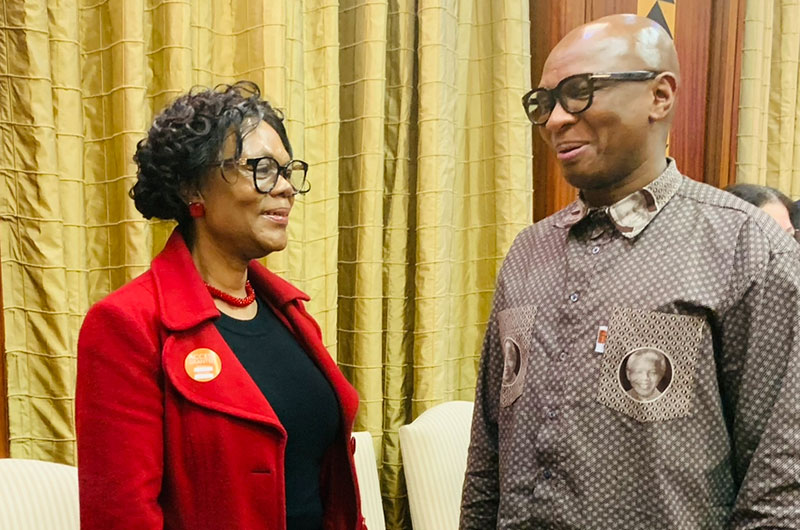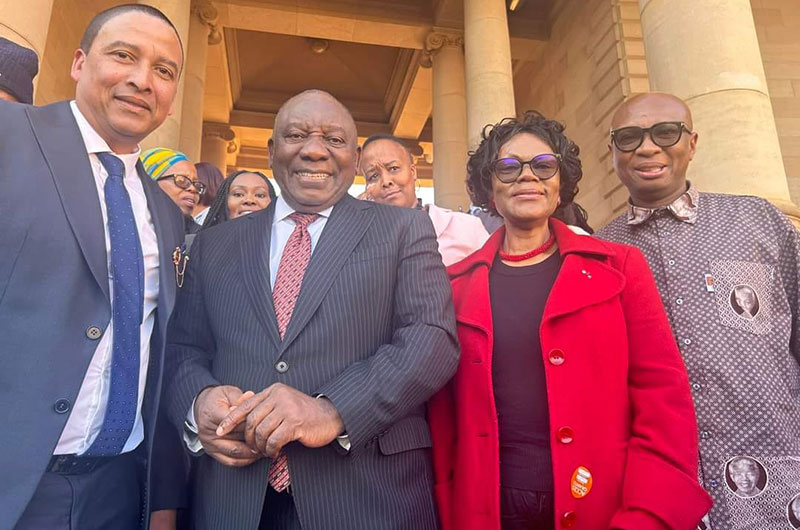Thumbs up: UCT welcomes Sign Language as SA’s 12th official language
10 August 2023 | Story Helen Swingler. Voice Cwenga Koyana. Read time 10 min.The University of Cape Town’s (UCT) Disability Service, Disability Studies unit and its Multilingualism Education Project (MEP) have welcomed the recent announcement that South African Sign Language (SASL) has become the country’s 12th official language.
The agreement was signed by President Cyril Ramaphosa at the Union Buildings in Tshwane on 19 July. This followed the National Assembly approval in May that Section 6 of the Constitution be amended to include SASL as an official language to promote the rights of persons who are Deaf and hard of hearing.
South Africa joins Kenya, Zimbabwe and Uganda as the fourth African country to recognise Sign Language as an official language.
Among those who attended the official signing was MEP’s director, Professor Lolie Makhubu-Badenhorst, who attended the ceremony in her capacity as chairperson of the Pan South African Language Board (PanSALB). Professor Makhubu-Badenhorst is also deputy chairperson of the Community of Practice for the Teaching and Learning of African Languages (CoPAL). This is part of the devolved governance structure of the Universities South Africa.

The ceremony was attended by several ministers and dignitaries, including Zizi Kodwa, the minister of Sport, Arts and Culture; as well as the CEO of PanSALB, Lance Schultz.
“It was indeed a historic moment in South Africa for the Deaf community and the language fraternity.”
“MEP applauds the decision to make SASL one of the 12 official languages,” said Makhubu-Badenhorst. “We feel it is rather long overdue. It was indeed a historic moment in South Africa for the Deaf community and the language fraternity in the promotion of multilingualism in the country,” said Makhubu-Badenhorst.
It is also a vital part of realising UCT’s Vision 2030, Makhubu-Badenhorst said, which is to unleash human potential to create a fair and just society.
“As the current chairperson of PanSALB, we had a great influence in the officialisation of SASL,” she added.
MEP is hosted in UCT’s Centre for Higher Education Development (CHED) and was launched in 2005 after approval of the university’s Language Policy and Plan by Senate and Council. The policy’s starting point is that UCT must prepare its students to participate fully in a multilingual society, where multilingual proficiency and awareness are essential.

“At UCT, we are planning to develop SASL as one of the languages for the currently reviewed UCT language policy,” said Makhubu-Badenhorst. “In addition, and as part of realising UCT’s Vision 2030, MEP is currently developing a SASL short course which later will be developed into a credit-bearing course extended for the mainstream offering at UCT as part of Vision 2030.”
Historic moment
Disability advocacy specialist Lesego Modutle, based in the Disability Service unit, part of UCT’s Office for Inclusivity & Change (OIC), also welcomed the development.
“It’s great for the institution to give recognition to such a historic event regarding a community that has done so well through the adversity of marginalisation. It’s a dream come true for the Deaf community which comprises of Deaf persons, children of Deaf adults (CODA), and South African Sign Language interpreters.
“SASL’s official recognition means that the Deaf community will be granted more access to information and to equal education.”
However, government must make sufficient budget available to implement this decision in a meaningful way, said Modutle. This will ensure that the following happen:
- SASL should be made an elective language in mainstream schools so that children can learn from an early age to be inclusive towards Deaf persons.
- Principals, teachers and staff that work at Deaf schools must learn fluent SASL and be sensitised on how to appropriately teach Deaf children using SASL as a medium of instruction.
- The curriculum at Deaf schools must be reviewed and brought on par with mainstream schools to ensure that the education of Deaf persons is equal to that of hearing persons.
- All institutions, companies and organisations must be mandated to set aside a budget for SASL interpreters so that more Deaf persons are employed – with full participation in their work environments.
- Important spaces such as schools, banks, hospitals, clinics, pharmacies, courtrooms, and police stations must employ full-time SASL interpreters, or at least have them on standby, so that Deaf persons have full access to these necessities.
Among the main challenges Deaf people face is access to information. There are too few people who understand SASL and too few interpreters, said Modutle.
“When urged to appoint SASL interpreters, the most heard response is ‘They are too expensive’.”
Another challenge is access to equal education.
“This is because SASL is not gestures of a spoken language; it is a fully fledged language with grammatical rules and structures.”
“We hope to see adequate resources distributed to Deaf schools to ensure that the principals, teachers and support staff are fluent in SASL and sensitised to appropriate teaching methods for Deaf children.” Modutle added. “We want to see many more Deaf matriculants and Deaf graduates, so a lot of work needs to be done in the education system.”
Key to understanding the challenges Deaf people face is that SASL is not a translation of spoken language, such as English.
“This is because SASL is not gestures of a spoken language; it is a fully fledged language with grammatical rules and structures that one must learn to understand the language,” Modutle explained. “The South African Deaf community communicates in SASL – not English Sign Language, or isiXhosa Sign Language, etc.
“The more people understand this, the more they can give the language the respect it deserves and embrace it fully as a communication tool, on the same level as other South African languages such as English, Afrikaans, isiZulu and Sesotho, and all the other official languages.”
Introducing SASL at UCT
Disability Service SASL interpreter Michelle de Bruyn is a CODA who grew up in and is part of the Deaf community. SASL was the first language she learnt.
De Bruyn said that in anticipation of the government’s announcement on 19 July, UCT had undertaken four important steps to facilitate communication with Deaf people. Other initiatives are in the pipeline.
First, is the UCT Libraries launch on 7 August of an audio/SASL tour of the libraries for students.
Jaimee Reid, senior librarian (undergraduate services), said the project will allow students to discover their library throughout the year, in their own time.
“The tour will be self-guided and will follow a route of nine stops in the library, showcasing different spaces and services that first-year and new students need to know.
“We are very excited to have the library tour available in SASL.”
To ensure students feel comfortable and included in the library, the tour will be offered in four languages: English, Afrikaans, isiXhosa, and SASL.
The tour will also be available through UCT Libraries’ website where students will be able to listen/watch in their language of choice and access the transcript if they require reading in their language of choice. To access the tour, students would require a mobile device and headphones/earphones, Reid said.
“We are very excited to have the library tour available in SASL, and really look forward to working with the Disability Service unit on further library projects.”
Second is a faculty-wide exercise to standardise all introductory information on their websites. This will include a video recorded in SASL (SASL does not have a written equivalent) to make the information more accessible.
Third, the Disability Service has developed a pilot project with the Centre for Educational Testing and Placement to have the National Benchmark Test (NBT) information available in a SASL video. This will be available on the new NBT website from January 2024. (There is already an NBT SASL information video on YouTube.) And for the first time, Deaf learners writing the NBT at UCT will have access to a Disability Service SASL interpreter. This service will start on 11 August, said De Bruyn.
Fourth, as part of a longer-term plan to make campus more accessible to Deaf visitors, Visitor Reception and Information Centre staff will be trained in SASL. Refresher courses will be available every six months. Campus maps and information will also be available through a quick response (QR) machine-readable code with a pop-up video in SASL. There are plans to place these QR codes on all UCT building signs to help Deaf visitors navigate the campuses.
Useful facts
Modutle also shared useful Deaf and SASL facts for noting by the UCT community:
- Deaf is written with a capital D as it symbolises those who make use of Sign Language as a medium of communication. Lower case d symbolises those who may be deaf or have a degree of hearing loss but make use of methods of communication such as oralism or Total Communication, etc.
- The letters s and I in Sign Language are to be in capital letters as it is a name of a language, just like spoken languages such as English, Setswana, German, etc.
- It is important to state that SASL has become official in South Africa as there are many Sign Languages all over the world (each country has its own Sign Language).
 This work is licensed under a Creative Commons Attribution-NoDerivatives 4.0 International License.
This work is licensed under a Creative Commons Attribution-NoDerivatives 4.0 International License.
Please view the republishing articles page for more information.






























































































































































































































































































































































































































































